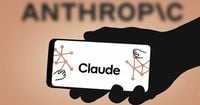In a significant upgrade for artificial intelligence users, Anthropic has launched web search capabilities for its AI assistant, Claude, allowing it to access current information while responding to queries. This enhancement marks an important step in addressing one of Claude's previous shortcomings compared to its rivals, including OpenAI's ChatGPT and Google's Gemini, both of which already integrate internet-connected capabilities.
Introducing the web search feature illustrates Anthropic's aim to position Claude as a complete AI assistant both for businesses and individuals alike. The decision comes after CEO Dario Amodei announced in early January 2025 that the company was working on advanced reasoning support and internet search abilities for Claude. Recently, Anthropic released Claude 3.7 Sonnet, which introduced reasoning features and included the long-awaited online search support.
The incorporation of web search into Claude 3.7 Sonnet enables the AI assistant to provide responses backed by current, real-time data, enhancing its ability to deliver accurate information. When Claude retrieves information from the web, it cites its sources directly, making it easier for users to verify the information received. This feature allows Claude to digest web pages and furnish content in an easily digestible conversational format—a characteristic that is becoming increasingly important in the AI landscape.
Notably, the web search capability is limited to paid subscribers in the United States for now. Users interested in utilizing this feature need to toggle on the web search option within their profile settings before engaging with the assistant. This selective availability aims to test the feature in a controlled environment before expanding access. Anthropic has indicated that support for free-tier users and the rollout to additional countries is on the horizon, which would further enhance Claude's appeal.
The upgraded Claude offers real benefits across multiple sectors. For example, sales professionals can leverage the new search feature to track industry trends, while financial analysts gain immediate access to current market data and earnings reports to inform their investment decisions. Similarly, researchers can strengthen their literature reviews by sourcing primary materials from the internet. Consumers can also benefit, using Claude to compare product features, pricing, and reviews from various sources, which aids in making informed purchases—crucially relevant in today’s fast-paced market.
As the competition heats up in the AI sales arena, being able to provide accurate, real-time data gives Claude a distinct advantage. OpenAI's recent launch of similar features for ChatGPT prompted significant updates to its user interface, showcasing the growing expectation for AI to not only understand language but also align with current events and information. The advent of Claude’s web search capabilities symbolizes a leap toward creating more responsive and dynamic AI systems that can serve real-world needs effectively.
Moreover, the online search feature adds a layer of trust, allowing users to check the information's accuracy—a response to growing concerns about the reliability of information generated by AI systems due to the potential for hallucination or inaccuracies. Reports have highlighted that Claude’s online search could become a key tool for enterprise users, with applications extending from analytics to enhanced consumer engagement.
Anthropic has emphasized that the Claude 3.7 Sonnet is not just about providing data but equipping users with a smarter AI companion that can contribute more effectively to their needs in a business environment. By allowing Claude to incorporate dynamic information, users can make decisions backed by timely insights, which is paramount in today’s swiftly changing business landscape.
Paid users of Claude will indeed find the video release of the search functionality beneficial for increasing productivity and efficiency, as they can now extract vital information directly relevant to their queries without having to leave the conversation flow. This adaptability positions Anthropic as a keen competitor in the AI assistant marketplace.
Channeling further insights into enterprise functionalities, Anthropic offers strong examples of how Claude could benefit various sectors, from financial analysis to consumer purchasing behavior. This holistic application of AI features aims to capture a wide audience of professionals and everyday users looking to enhance their decision-making capabilities in a rapidly evolving digital age.
With Claude’s abilities evolving to include web access and advanced reasoning, Anthropic is carving a niche within the burgeoning AI market while presenting itself as a formidable opponent to established players. The innovative features of Claude 3.7 Sonnet not only reflect the company's adaptability but also signify the future direction of AI, with a broader intention to seamlessly integrate into everyday tasks that require a blend of automation, intelligence, and updated information.
As AI technology advances, consumers are becoming increasingly aware of what they need from their digital assistants. They value not just intelligent responses, but also the up-to-date insights that come from a platform that can look up information in real time. This updated wave of Claude exemplifies a model that appeals to both individual users and corporate clients striving for information robustness and reliability.
The timeline of these developments continues to unfold, with many eager to see how Claude's integration of web search will transform the landscape of AI assistance further. As Anthropic cultivates this feature, they cement their place in the competitive landscape of AI technologies, paving the way towards innovations that meet user demands for versatility and accuracy.


